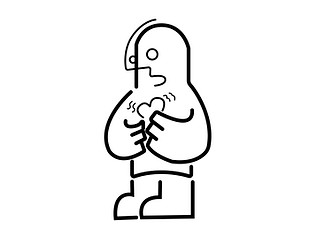
ANCHORCALM.
INTERACTIVE MEDICAL DEVICE
OVERVIEW
An assistive products kit to help panic attack patients alleviate their symptoms. It offers patients an innovative way of anxiety-relieving interaction and build their confidence in managing panic attack.
SKILLS
User Research, Sketching, Prototyping, Mechatronics, User Testing, 3D Modeling, Digital Rendering
ROLE
UX Designer
Industrial Designer
DATE
2023
RESEARCH

PANIC ATTACK
is an abrupt and discrete experience of intense fear and anxiety or acute discomfort, accompanied by symptoms such as heart palpitations, shortness of breath, sweating, trembling, and worries about going crazy, losing control, or dying.
6,000,000+
american adults are affected by panic disorder, according to The National Institute of Mental Health.
EXPERIENCE AND RELIEF SURVEY
UNITED KINGDOM:
50 Responses
Age: 18-99
Health Issues: Panic
Disorder, Anxiety
UNITED STATES:
80 Responses
Age: 18-44 (47%),
45-99 (53%)
Health Issues:
Anxiety Disorders

CHINA:
55 Responses
Age: 18-99
Health Issues:
Panic Disorder,
Anxiety
INDIA:
56 Responses
Age: 18-99
Health Issues:
Anxiety

71.4%
of respondents don't have any emergency kits/ supportive devices to cope with sudden panic attacks.

74.4%
of them want to have products that can help them alleviate panic attacks.

MOST TYPICAL SYMPTOMS OF PANIC ATTACKS
-
72% Rapid heartbeat
-
67% Shortness of breath
-
60% Sweating/ Trembling
-
43% Dizziness/ Nausea
-
38% Fear of going crazy, losing control, or dying

THE MAIN TRIGGERING FACTORS
-
69% Stress from life
-
47% Traumatic experiences
-
37% Specific situations
-
36% Issues in relationships
-
24% External stimuli

THE MAIN TRIGGERING FACTORS
-
60% Breathing control
-
48% Shifting attention
-
41% Mindfulness meditation
-
40% Focusing on senses
-
40% Seeking help from
others

MOST PREFERRED MATERIALS FOR SYMPTOM RELIEF
-
42% Soft fabric
-
29% Smooth surface
-
28% Foam materials
-
21% Fuzzy fabric
-
16% Silicone
PAIN POINTS
FEELING TRAPPED
Patients feel trapped and unable to seek help when alone.
EMBARRASSMENT
Patients feel embarrassed when having an attack in a crowded public place.
HYPERVENTILATION
Lacking protection for hyperventilation, while the current paper bag breathing method is neither comfortable nor convenient.
ANXIETY
Patients are often too worried and anxious to implement breathing control or shift their attention
effectively.
ACCESSIBILITY
Patients struggle to access various sensory experiences and cannot promptly reach symptom relief materials or assistance.
SKETCHES

DEVELOPMENT PROCESS

SILICONE PAD CRAFTING
TECHNOLOGY DEVELOPMENT

SEWING
PATTERNS

THE ANCHORCALM GLOVE
The AnchorCalm Glove is made from soft fabric, which is mostly preferred by patients, to help alleviate their symptoms. The magnet in the palm area can firmly attach different anxiety-relieving material modules to prevent the situation when the user's hands are numb and unable to grip securely.
THE ANCHORCALM MASK
The AnchorCalm Mask stores the user's exhaled gases to prevent respiratory alkalosis. It is also equipped with a CO2 sensor to constantly monitor the patient's breathing status. The lights near the cheekbones will alert the user if they are hyperventilating or wearing the mask for too long.


THE UTILITY POUCHES
The utility pouches can accommodate various AnchorCalm devices. The flip-down lid structure allows users to take out items with one hand easily. The V-shaped notch prevents the scented chips behind from being pulled out together when removing the front one.
THE ANCHORCALM BELT
Users can attach the utility pouches to the AnchorCalm Belt and carry the device effortlessly without needing additional baggage. This way, no matter where and when a panic attack occurs, AnchorCalm will provide timely and convenient assistance.

PROTOTYPE









